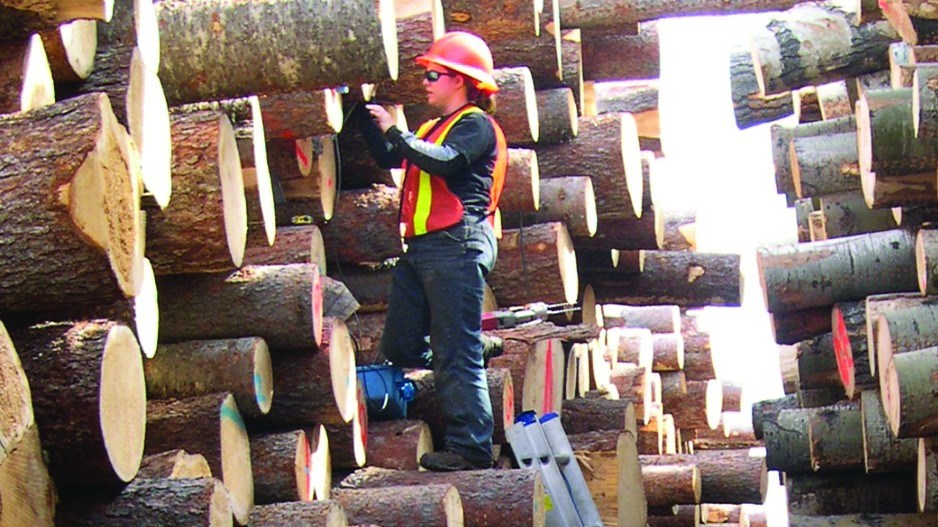An experienced team of forest industry entrepreneurs with a solid track record are partnering with the Fort Nelson First Nation to revive that region’s forest industry.
Last week, Canfor Corp. (TSX:CFP) announced the planned sale of its Fort Nelson Crown tenure to Peak Renewables, a startup backed by Brian Fehr, Order of BC recipient and founder and former owner of the BID Group, for $30 million.
Peak Renewables had already earlier purchased the old Canfor sawmill and oriented strand board (OSB) assets in Fort Nelson. That mill and plant have been shut down for more than a decade, and as a result, Fort Nelson is one of the few regions in B.C. with a surplus of harvestable timber. It recently got a bump in its annual allowable cut (AAC) because it has been under-harvested.
But since 60% of the trees in that region are deciduous – mostly aspen – Fort Nelson has not had much luck attracting investors to restart the sawmill, since aspen is not suited for making lumber.
So Peak Renewables plans to build a wood-pellet manufacturing plant on the old Canfor site, which still has buildings, a log pond and a biomass energy plant.
It would produce 600,000 metric tonnes of pellets annually, to be exported to Asia, where pellets are burned, as an alternative to fossil fuels, to produce heat and power.
Peak Renewables CEO Brian Baarda, former CEO of Paper Excellence, said the plant would employ about 50 people. The woodlands operations would employ 300 to 400 in logging. The company’s chief forester formerly worked with Mosaic and its predecessor, TimberWest.
“We’ve got a great team of individuals,” Baarda said. “Brian [Fehr has] built pellet plants before. We have tons of experience in the team to pull this thing off.”
Baarda would not say how much the company plans to invest, but said a typical pellet plant costs about $100 million to build, although he said there is already about $70 million worth of assets at the old Canfor site.
The investment has the backing of the Fort Nelson First Nation, will have an equity stake in the plant, Baarda said.
The sale of Canfor’s tenure to Peak Renewables will have to get the approval of the forestry minister, and the community will have a say in the matter.
Mike Gilbert, regional development officer for the Northern Rockies Regional Municipality, expects most people in Fort Nelson will support the project. The community has been trying for years to persuade investors to invest in a mill or plant that would create jobs in the local logging sector.
“I would say that if there’s any activity, anything that would generate activity locally in the forest industry will get a lot of positive attention,” Gilbert said.
Should the tenure sale be approved, the new pellet plant could be up and operating by 2022, Baarda said.
He added that other value-added manufacturing could develop around a revived logging industry. Furniture manufacturing is one possibility, since aspen is good for making furniture.
“Somebody might want some of that high-grade aspen and turn it into, probably, the best furniture around,” Baarda said. “Once you’ve got somebody that’s out there harvesting, it creates all those secondary opportunities.”
About 40% of the trees in the Fort Nelson are coniferous (spruce, pine and fir), which are suitable for sawmilling. Coniferous trees harvested in the area will be sold to other sawmills, at least initially.
“It will supply mills probably as far down as Prince George with some of those coniferous logs, at least in the short run, as we get the pellet plant built,” Baarda said. “Phase 2 would be looking at other value-added activities.”
Fort Nelson First Nation Chief Sharleen Gale said she expects the pellet plant, as an anchor to the local forest industry, will benefit the First Nation by helping it develop its own forestry businesses and tenures. Peak Renewables will also conduct logging operations according to the Fort Nelson First Nation’s land use plan.
“It won’t replace the hundreds of good forestry jobs that were lost a decade ago with Canfor pulling up their stakes and leaving the area, but we believe this will be good for the community,” she said.




